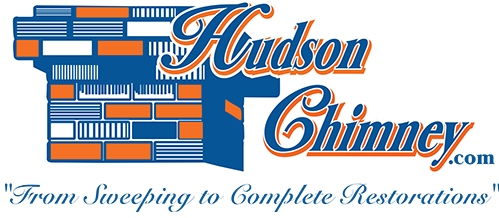by Mark Hudson | Dec 13, 2015 | Water Damage And Chimneys
Since your chimney extends from your roof, it is exposed to all of the elements of weather, including rain and snow. While masonry chimneys are built to last the lifetime of a house, this constant exposure to water from rain and melted snow can cause damage and deterioration to a chimney, especially if it is neglected. The Chimney Safety Institute of America (CSIA) claims that water is the biggest enemy of a masonry chimney and recommends regular maintenance to prevent expensive repairs due to water penetration damage and deterioration. Hudson Chimney would like to tell you more about how water damages your chimney and how we can help prevent this damage and deterioration.
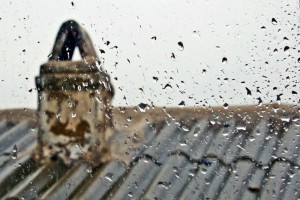
How can water damage my chimney?
According to the CSIA, all of the masonry materials that are used to build a chimney can suffer from accelerated damage after being exposed to water for a long period of time. Water causes the bricks and mortar to erode, and during the winter when the temperature drops below freezing, any water that has been absorbed into the bricks and mortar will freeze and expand. When the weather warms up, this water will thaw and cause the masonry materials to crack and break apart. This type of damage is also known as spalling, and if left unrepaired, it can lead to bricks and pieces of mortar falling from the chimney as well as the collapse of the entire structure. If water leaks into a chimney, it can also cause rusting damage to the liner, damper, and other metal components, and it can even damage the interior of your home by staining ceilings and walls.
How can Hudson Chimney protect my chimney from water damage?
Our CSIA-certified chimney technicians have several ways to prevent water penetration of your chimney: chimney caps, flashing, and waterproofing.
Called the least expensive way to prevent water penetration of a chimney, a chimney cap keeps water from even entering into your chimney. We have several different types of caps, and our chimney experts can help you find the perfect cap for your chimney and install the cap to completely cover the opening. Chimney caps have other benefits as well, including keeping birds and animals out of the chimney and preventing hot embers and sparks from jumping out of the chimney to ignite an accidental fire. We also have chimney caps that can help improve the draft in your chimney if you have problems with backdrafting.
Consisting of pieces of metal, flashing wraps around your chimney where it meets the roof to keep water from getting in at that point. In our years of working on chimneys, we have seen inadequate flashing systems that are coming apart and actually let water enter into the chimney. We construct customized flashing systems to completely protect your chimney from water penetration. We also work with state-licensed roofers to ensure the flashing fits correctly along the roof.
Using a 100% vapor permeable formula, our chimney technicians can waterproof your chimney by applying a coat of this formula to your entire chimney. We use ChimneySaver products that are designed especially for chimneys. This formula provides a barrier on your masonry chimney that keeps water from leaking into the bricks and mortar but allows fumes and vapors to easily escape so that they do not become trapped to cause further damage.
Protect your chimney from water damage this winter. Contact us at Hudson Chimney to schedule an appointment for one of our water penetration prevention services.
by Mark Hudson | Aug 20, 2015 | Chimney Crown Info
Just as you would think from the name, chimney crowns sit at the very top of masonry chimneys to prevent water and animals from getting inside the chimneys. A crucial part of a masonry chimney system, your chimney crown needs to be in good condition to best protect your chimney. If your crown is suffering from hairline cracks, your chimney could be in danger of even more cracking and spalling damage. Luckily for the residents of the Jacksonville, FL area, Hudson Chimney specializes in repairing and building chimney crowns. We would like to tell you more about this important part of your masonry chimney by sharing with you some information from the Chimney Safety Institute of America (CSIA) about chimney crowns.
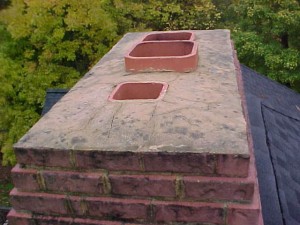
What exactly does a chimney crown do?
Covering the top of the chimney to seal it from the flue liner to the chimney edge, a chimney crown constructed by Hudson Chimney provides a downward slope to direct water from the flue to the edge of the crown. Without a chimney crown, the entrance to your chimney is wide open and can easily be invaded by water from rain and melted snow and animals such as birds, raccoons, and squirrels. Both water and animals will do a lot of potentially expensive damage to your masonry chimney, which is why it is so important to have a properly built chimney crown on the top of your chimney.
What kind of damage can water and animals do to my chimney?
The CSIA calls water the biggest enemy of masonry chimneys because it erodes away bricks and mortar. Hudson Chimney often sees spalling damage, which is caused when water that has penetrated masonry materials freezes within those materials, it expands. As the water thaws out, it forces the bricks and mortar to crack and break apart. If this type of damage is left untreated, the structure of your chimney is in jeopardy as it could collapse. The greatest type of damage done by animals has more to do with the nesting materials they leave behind in your chimney. Abandoned animal nests in a chimney create dangerous hazards such as fires ignited from the materials and debris and flue blockages that can cause poisonous gases like carbon monoxide to be forced back into your home.
What are the details of a properly built chimney crown?
Constructed from a Portland cement-based mixture, a proper chimney crown should be installed so that it provides an overhang projecting beyond all sides of the chimney by a minimum of two inches. Hudson Chimney additionally ensures that the flue liner tile projects above the crown also by a minimum of two inches.
Concerned about your chimney crown? Contact Hudson Chimney to inspect the condition of your crown and make recommendations for repairs or a rebuild. You can trust us to protect the inside of your chimney with a correctly constructed and installed chimney crown.
by Mark Hudson | Jun 4, 2015 | Storm Damage
Since we call Northeastern Florida our home, Hudson Chimney is familiar with the heavy rains that come with summer storms, and we are very experienced with the damage these rainstorms can do to chimneys. Repairing leaky chimneys and preventing further water penetration of masonry chimneys are two jobs you can trust our certified chimney technicians with performing. We would like to tell you more about the damage water leaks can do to your chimney and your home as well as the preventive measures we can take to protect your masonry chimney from the heavy rains of the summer storms we frequently see in our area.
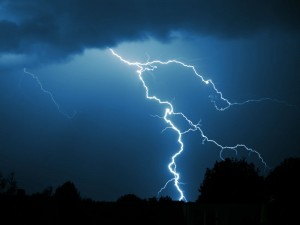
THE DAMAGE DONE BY WATER PENETRATION
According to the Chimney Safety Institute of America (CSIA), water is your masonry chimney’s biggest enemy. Since chimneys are built using materials like brick, mortar, concrete, stone, flue tile, steel, and cast-iron, they are seriously compromised by water leaks because every one of these building materials are negatively affected by direct contact with water. What kind of damage can water penetration do to your masonry chimney system and home? Examples of the expensive and possibly dangerous damage from water leaks include the following:
- rusted fireplace and chimney parts
- rotted wood that surrounds your fireplace
- stains on the walls and ceilings around your fireplace
- deteriorated exterior chimney
- cracked or damaged flue liner
- collapsed hearth support
- leaning or collapsed chimney structure
THE PREVENTION OF WATER LEAKS
The certified chimney technicians at Hudson Chimney offer a couple of ways to protect your masonry chimney from water penetration and remove the possibilities of water leaks, including:
Waterproofing
Using a 100% vapor permeable formula that allows your chimney to still be able to “breathe,” our chimney technicians will apply this formula to let water that has already penetrated your masonry chimney escape, which will prevent future damage such as spalling and erosion due to the freeze-thaw process. Furthermore, the waterproofing formula keeps water from entering from the outside to protect your masonry chimney from water leaks and other deterioration. You can trust Hudson Chimney to never use paint or clear sealers as these may cause even more spalling damage by trapping water vapors and moisture inside your chimney.
Flashing
A poorly done flashing job can actually cause water to penetrate your chimney because water from rain and melted snow can enter through gaps in the flashing. Our technicians will customize the flashing to properly fit around your exterior chimney where it meets the roof. We will work with a licensed roofer to guarantee the flashing has been done correctly.
Be prepared for the heavy rains from the upcoming summer storms. Contact Hudson Chimney to prevent water penetration damage of your masonry chimney.
by Mark Hudson | May 8, 2015 | Chimney Leaks
Do you have a masonry chimney? If you do, you may already know that the likelihood of having a leaky chimney can be quite high. Why are masonry chimneys so likely to experience water leaks? The Chimney Safety Institute of America (CSIA) answers this question by stating that water is the biggest enemy of a masonry chimney. Every component of your chimney can possibly suffer expensive and extensive damage when water penetrates into your chimney. Stained ceilings or walls, loose bricks and chipped mortar on the exterior of your chimney, and musty or moldy odors coming from your fireplace are all signs of a leaky chimney. If you have seen any of these signs, it is crucial to contact a professional chimney company like Hudson Chimney to locate the source of the leak and make repairs so that your fireplace and chimney system can function safely and properly. But, what exactly can lead to a leaky chimney? We would like to tell you four problems that allow water to easily penetrate your chimney.
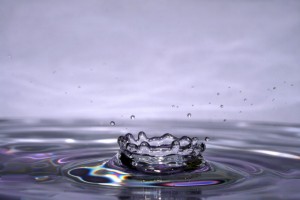
1. DAMAGED OR MISSING CHIMNEY CAPS
Chimney caps are your least expensive preventive measures against water penetration because they cover the top of your chimney. Freezing temperatures and destructive animals trying to get into your chimney can cause cracks and other damage your chimney cap. When your chimney cap is damaged (or even worse, missing completely), water from rain and melted snow can easily get into the masonry work of the interior of your chimney. Hudson Chimney offers a wide variety of chimney caps, and our certified technicians can install a custom-fitted cap to protect your chimney from water leaks.
2. DETERIORATED CHIMNEY CROWNS
Located directly beneath the chimney cap, a chimney crown is constructed from concrete and used to seal the opening of your chimney. Unfortunately, your crown could be made from the wrong or ineffective material, or it could be improperly installed. In these situations, damage and deterioration will occur sooner than later, and you will have an opening to your chimney where water can easily enter. The masons at Hudson Chimney can repair damaged chimney crowns as well as correctly install custom-made crowns to keep the water out of your chimney.
3. DAMAGED FLASHING
Flashing is sheeting made from metal that is placed between your chimney and your roof to protect this area from water leaks. Easily improperly installed, not every chimney company will the time to customize the flashing itself for a perfect fit. Our technicians will customize flashing by carefully measuring each part of your chimney and its surrounding areas on your roof so that it fits exactly and leaves no holes or cracks, which allow water penetration of your chimney.
4. WORN OUT MORTAR JOINTS
Water deteriorates the essential mortar joints that hold your chimney together and creates holes and cracks within the masonry. In the winter, water trapped in your chimney freezes and thaws, which leads to the bricks breaking and crumbling, and this will cause even more water leak problems. Fortunately, Hudson Chimney can do masonry repairs using the tuck pointing process. Once we have completed these repairs, we can apply a waterproofing treatment that will ensure that your masonry work in your chimney is protected from any water leaks in the future.
Dealing with a leaky chimney? Contact Hudson Chimney to schedule a visit from one of our certified masons to fix your water penetration problems.
by Mark Hudson | Apr 6, 2015 | HeatShield
If you live in an older home with a masonry chimney, it most likely has a clay tile flue liner. Clay tiles have been used to line chimney flues since the beginning of the 20th century, and there are good reasons why. These tiles can withstand extremely high temperatures, and they hold up well against the corrosive byproducts of combustion that pass through the flue on their way out of the chimney. Once installed, clay liners will stay in good shape up to 50 years. However, when the clay tiles become cracked and chipped over time, it can be costly to repair them or to replace the liner as it is a very difficult and time-consuming task. When the HeatShield Chimney Repair and Resurfacing System was developed around 20 years ago in Europe, repairing and relining a clay tile liner became so much easier and less costly. At Hudson Chimney, our technicians are experienced with using HeatShield, and our customers who have had their clay flue liners repaired or replaced with this product have all been very satisfied. We would like to tell you more about HeatShield and what it can do for your clay tile-lined chimney.

What exactly is HeatShield?
A specially formulated “Cerfractory” sealant material, HeatShield can restore the integrity of your chimney’s flue to vent out toxic gases from your home. Eliminating the dangers in your flue caused by cracks, gaps, and spalling, HeatShield will make your chimney as safe and as efficient as it originally was when first built. Depending on the condition of your clay tile liner, the Joint Repair system or the Resurfacing System will be used.
What does the Joint Repair system do?
If our chimney inspectors at Hudson Chimney only find defective mortar joints in your clay tile liner, we will use the Joint Repair system. First we will make a custom-made foam applicator blade to fit your chimney. Once this tool has been inserted into your chimney and positioned below each gap or void, we will then add the HeatShield Cerfractory Flue Sealant mixture. Each void and gap will be filled, and when we pull out the foam applicator blade, it will smooth the filled gaps and voids as it comes out of your chimney. Then we scan the repair with a special video camera to be sure the repairs have been done correctly.
What does the Resurfacing System do?
If your chimney liner has a cracked or spalled flue but is still sound, we will use the Resurfacing System. Again, we will make a custom-fit foam applicator plug that will be placed at the bottom of the flue and attached to a winch atop the chimney. We then prime and clean your old liner with a “tie coat” material, which is applied to the flue walls by pulling the plug upwards with the winch. After this coat dries, we then apply the HeatShield mixture with the foam plug in the same way we applied the primer. This method is called “slip casting” or “slip cast extrusion.” After this is applied, we will look at the scanned video to be sure your entire chimney is sealed and smoke-tight.
Have more questions about HeatShield? Contact Hudson Chimney to talk to our staff to see if HeatShield is right for your clay tile chimney liner.
